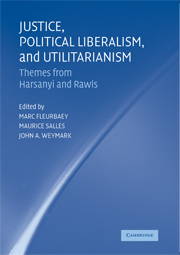Book contents
- Frontmatter
- Contents
- Preface
- List of Contributors
- 1 An Introduction to Justice, Political Liberalism, and Utilitarianism
- PART ONE THEMES FROM RAWLS
- PART TWO HARSANYI'S IMPARTIAL OBSERVER AND SOCIAL AGGREGATION THEOREMS
- PART THREE GOODNESS AND WELL-BEING
- 9 Can There Be a Preference-Based Utilitarianism?
- 10 Harsanyi, Rawls, and the Search for a Common Currency of Advantage
- 11 Utilitarianism versus Fairness in Welfare Economics
- 12 Rationality and Want-Satisfaction
- PART FOUR SHARING THE GAINS FROM SOCIAL COOPERATION
- PART FIVE RIGHTS AND LIBERTIES
- Index
9 - Can There Be a Preference-Based Utilitarianism?
Published online by Cambridge University Press: 09 February 2010
- Frontmatter
- Contents
- Preface
- List of Contributors
- 1 An Introduction to Justice, Political Liberalism, and Utilitarianism
- PART ONE THEMES FROM RAWLS
- PART TWO HARSANYI'S IMPARTIAL OBSERVER AND SOCIAL AGGREGATION THEOREMS
- PART THREE GOODNESS AND WELL-BEING
- 9 Can There Be a Preference-Based Utilitarianism?
- 10 Harsanyi, Rawls, and the Search for a Common Currency of Advantage
- 11 Utilitarianism versus Fairness in Welfare Economics
- 12 Rationality and Want-Satisfaction
- PART FOUR SHARING THE GAINS FROM SOCIAL COOPERATION
- PART FIVE RIGHTS AND LIBERTIES
- Index
Summary
Introduction
John Harsanyi has made several fundamental contributions to utilitarian thinking; they are so well known that I do not need to set them out here. It was natural for him, as an economist, to present his utilitarian arguments in terms of preferences. His great influence has been a major factor in diverting the mainstream of utilitarian thinking toward a preference-based – I shall call it preferencist – version of utilitarianism. Preferencism is the view that good – what is good for a person and what is good overall – is determined entirely by people's preferences. However, Harsanyi himself brings into his arguments elements that are not preferencist, and I think that was inevitable. Preferences may partly determine good, but other things must enter too.
To an extent, this is obvious. If good is determined by preferences, we have to ask what determines how it is determined by preferences. If good is a function of preferences, what determines the functional form? Perhaps the functional form might itself be determined by preferences, but then what determines the way that happens? At some level, something other than preferences must come into the determination. In this chapter, I shall investigate what extra besides preferences is required to produce a coherent version of utilitarianism. How preferencist can utilitarianism be? It does no great harm to preferencism if nonpreferencist considerations of some sort have to be brought in from elsewhere. But it would be seriously damaging if we had to import substantive claims that make good depend on something other than preferences. Claims like these would actually conflict with preferencism.
- Type
- Chapter
- Information
- Justice, Political Liberalism, and UtilitarianismThemes from Harsanyi and Rawls, pp. 221 - 238Publisher: Cambridge University PressPrint publication year: 2008
- 9
- Cited by

